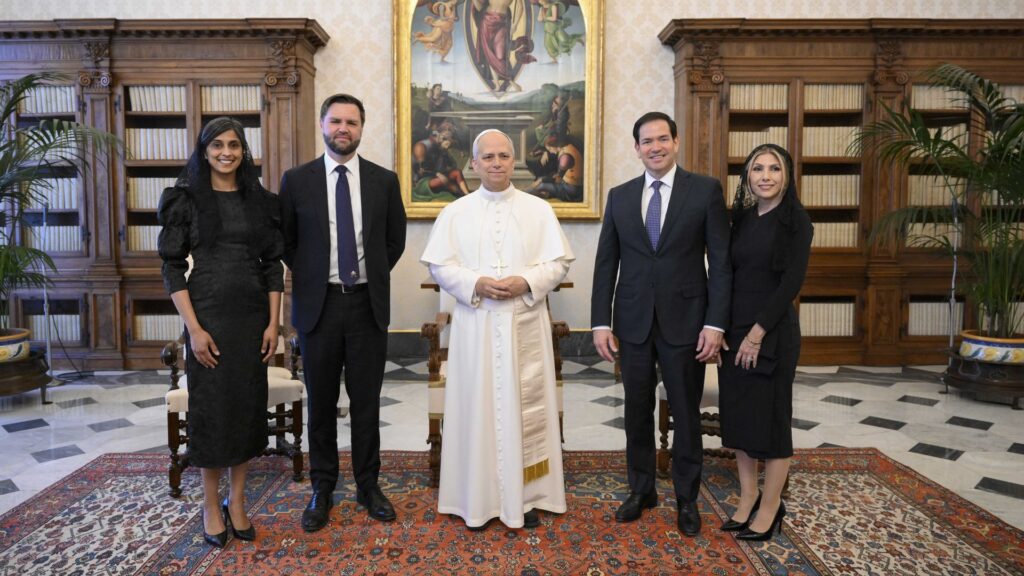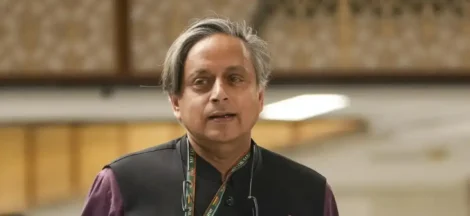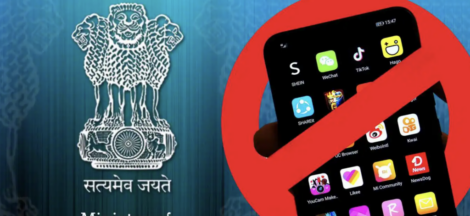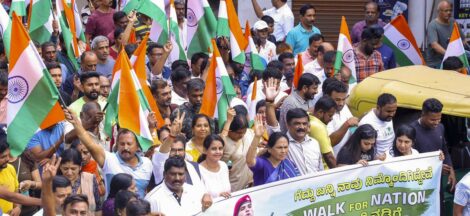By T N Ashok
NEW YORK: US President Donald Trump has virtually called off his peacemaking efforts with Ukraine and Russia to break their ongoing conflict after his two-hour talk on Monday with so-called buddy Russian President Vladimir Putin ended in a no entry zone. Now the Vatican has entered the scene to host the peace talks between the Russian and Ukrainian leaders.
One does not know if President Trump asked the Chicago born Pope Leo XIV for help to bail him out and host the talks so that both leaders would listen to him. But VP JD Vance indeed met the new pope from Chicago Leo XIV and explained the global situation including Ukraine.
Trump spoke with both Russian President Vladimir Putin and Ukrainian President Volodymyr Zelenskyy and other leaders in separate calls Monday, in an attempt to stop the “bloodbath” of the war in Ukraine.
But the president’s peace initiative ended inconclusive leaving him frustrated. Russia and Ukraine would now hold direct talks on a ceasefire “immediately,” Trump said afterward in a post on his social network Truth Social.
However, it was unclear what form those talks would take or when they would happen. The Vatican, Trump said, has expressed interest in hosting the negotiations. “The conditions for that will be negotiated between the two parties, as it can only be, because they know details of a negotiation that nobody else would be aware of,” he said. Trump’s call with Putin lasted more than two hours and “was very informative and very open,” Putin told Russian state media.
Trump said little about his conversation with Zelenskyy, with whom he spoke first, other than to say that he had informed Zelenskyy and the leaders of other NATO countries of the negotiations. White House officials declined to offer any further details. Trump spoke with Zelenskyy twice on Monday, according to Zelenskyy, once one-on-one, before Trump’s call with Putin, and again during a conference call with the Ukrainian and NATO leaders.
“I reaffirmed to President Trump that Ukraine is ready for a full and unconditional ceasefire,” Zelenskyy tweeted. “If the Russians are not ready to stop the killings, there must be stronger sanctions,” he wrote. “Pressure on Russia will push it toward real peace — this is obvious to everyone around the world.”
In a Monday interview with NBC News in Rome, where he was received by Pope Leo XIV, Vice President JD Vance said, “We talked about a couple of what I would call the president’s major peace initiatives with the pope. We talked a lot about what’s going on in Israel and Gaza. We talked a lot about the Russia-Ukraine situation. It’s hard to predict the future, but I do think that, not just the pope, but the entire Vatican, has expressed a desire to be, you know, really helpful, and to work together on facilitating, hopefully, a peace deal coming together. Can’t predict the future, but that was very meaningful, and I think will hopefully bear fruit for the country.”
Meanwhile, Putin’s spokesperson Dmitry Peskov said before the call that Russia “highly values” and is “grateful to the American side.” In a briefing with journalists, he said that if the U.S. can “help to achieve our goals through peaceful means, then this is indeed preferable.”
Peskov was also asked about the chance of Trump and Putin meeting in person, a possibility the American president floated on Friday. “It will largely depend on what they themselves decide,” Peskov said. The meeting “needs to be worked out” by the two leaders in terms of dates and other details, he said.
Ahead of the much anticipated Trump-Putin call, leaders from Britain, France, Germany and Italy said they spoke Sunday with Trump. The British government said in a statement that it was urging “Putin to take peace talks seriously.” Those leaders “also discussed the use of sanctions if Russia failed to engage seriously in a ceasefire and peace talks,” the statement said — something Trump has previously threatened.
There have been several rounds of peace talks to end the Russian invasion of Ukraine since it began in February 2022. Russia’s president Vladimir Putin seeks recognition of all occupied land as Russian, for Russia to be given all of the regions it claims but does not fully control, guarantees that Ukraine will never join NATO, and the lifting of sanctions against Russia. Ukraine’s president Volodymyr Zelenskyy seeks a full withdrawal of Russian troops, the return of prisoners and kidnapped Ukrainian children, prosecution of Russian leaders for war crimes, and security guarantees to prevent further Russian aggression.
The first meeting between Russian and Ukrainian officials took place four days after the invasion began, on 28 February 2022, in Belarus, and concluded without result. Later rounds of talks took place in March 2022 on the Belarus–Ukraine border and in Antalya, Turkey. Negotiations in Turkey created an agreement in which Ukraine would abandon plans to join NATO and have limits placed on its military, while having security guarantees from Western countries, and not being required to recognize Russia’s annexation of Crimea. The draft treaty was almost agreed to, but disagreements over security guarantees and the Bucha massacre ultimately halted negotiations.
Renewed negotiations began in 2025 after Donald Trump became president of the United States. Trump held a phone call with Putin on February 12 this year and U.S. officials met with Zelenskyy shortly after. Saudi Arabia emerged as the primary host country for peace talks. After a U.S.–Russia summit, the relationship between Trump and Zelenskyy deteriorated, culminating in a 28 February meeting between the two in which U.S. officials asked the Ukrainians to leave midway through and abandoned a planned Ukraine–U.S. mineral revenue deal. After the meeting, British prime minister Keir Starmer and French president Emmanuel Macron created a plan for a ceasefire protected by a “coalition of the willing” with troops in Ukraine. Starting from March, some limited truces were occasionally agreed to by both Russia and Ukraine. (IPA Service)




